- Home
- Joel Rosenberg
Not Exactly The Three Musketeers
Not Exactly The Three Musketeers Read online
Not Exactly The Three
Musketeers
Guardians Of The Flame
Book VIII
Joel Rosenberg
First mass market edition: February 2000
First edition: February 1999
ISBN 0-812-55046-3
Copyright © 1999
CONTENT
Dedication
Part I
Chapter 1
Chapter 2
Chapter 3
Chapter 4
Chapter 5
Chapter 6
Chapter 7
Chapter 8
Chapter 9
Chapter 10
Part II
Chapter 11
Chapter 12
Chapter 13
Chapter 14
Chapter 15
Chapter 16
Chapter 17
Chapter 18
Chapter 19
Part III
Chapter 20
Chapter 21
Chapter 22
Chapter 23
Chapter 24
Chapter 25
Chapter 26
Chapter 27
Part IV
Chapter 28
Dedication
This one is for
(in order of seniority):
Doran, Judy,
Kendra, Rachel, and Zara.
Part I
Chapter 1
Their Attention is Arrested
“There will be payment for your crimes, foul deceiver. Justice demands an accounting!'' Enh.
Beneath the flickering of the uncaring stars, the smoking torches, and the slow, crimson-to-orangeto-blue pulse of the distant faerie lights, the handsome young warrior leveled the point of his absurdly too-short spear at where the obese form of the wicked prince cringed in a bed that was too small, although understandably so: a full-sized bed would have taken up too much room.
"Aye," the young warrior said, his voice a stage whisper that could carry as far as need be, his accent foreign although impossible to place, "you may count on it, traitor Prince. You sold out Barony Furnael, and today there'll surely be an accounting."
That had already been said, and not particularly well, either.
"By my fathers and theirs, I swear there'll be an accounting," the ramrod-straight nobleman echoed, clapping his hand to the young warrior's shoulder. "I swear that to you, Pirondael, and to you, Walter Slovotsky."
Again, he repeated himself. Redundantly.
Argh.
Neither the warrior nor the nobleman at his side seemed to notice how the prince's hand fumbled with a blade under his pillow. It wasn't as though it was hidden from them, but their gaze never left the prince's face.
"An accounting," the evil prince said with a snicker, "you'd have an accounting, would you? Of course I sold off your barony, Furnael. It was dead, gone, lost, a rotting corpse, stinking in the sun. Are those words you do not understand, dear Baron? If the corpse could serve Bieme, then how could I not let the Holts consume the body bite by bite? Why should I not have allowed them to feast on the carrion?" He leaned forward, as though about to impart a secret, and the baron leaned forward as though to receive it, pausing dramatically, as no word would have been able to be heard through the gasps.
Pirojil leaned back in his seat as the scene played itself predictably, inexorably, repetitively toward the moment that Pirondael would stab Furnael, and then Walter Slovotsky would kill the prince with the single throw of a knife.
He had seen much better, but what had he expected? Birth of an Empire was hardly a classic in the spirit of Iranys or Tea for the Tendentious. The stage was too small, and the actors were by no means the best in the empire.
It did have some virtues, though: for one thing, of the three playhouses open in Biemestren, the House of Wise Tidings was the only one featuring a production Pirojil had not already seen at all, much less repeatedly. For another thing, the lighting was well done: save for the stage, the room was dark, and in the dark, Pirojil was no more ugly than anybody else; his massive, irregular brows, his huge broken nose and jutting jaw did not offend.
At that thought, his blunt fingers went to the signet ring on his finger, the gem as always turned inwards. Of his birthright, it was all that he had kept, though he didn't know why he kept it; Pirojil had long since given up any nostalgia about his short childhood.
The worst thing about the play, though, was the play.
Who was this idiot playwright, and what could be done to stop him before he wrote again?
"Aiee!" Baron Furnael screamed. "I am stabbed."
Enough. That was enough for Pirojil. Some light theater in the dark was one thing; to watch an incompetent pretty boy - the hair at his temples whitened to simulate middle age because he wasn't enough of an actor to simply act middle-aged - prance about the stage awkwardly pretending, well, that was not a way to spend the rest of the evening.
Enough.
Time to go back to the rooms, or maybe stop by the barracks. The small detachment from Barony Cullinane was billeted in the imperial barracks, and perhaps there would be something interesting to do there, or in one of the taverns that sprouted up in the neighborhood like mushrooms on a cow flop.
There would be, at least, a fight to get into. The feel of blood on his knuckles or even in his mouth would distract him, for a while. You did the best you could, after all.
He rose and apologetically worked his way to the aisle - there was no need to interfere with the rapt enjoyment of the audience - then up the stone steps to the exit passageway, just barely conscious of the way he reflexively re-rigged his sword to hang properly at his side, hilt forward, not quite projecting from his cloak.
As he walked down the sharp-edged stone steps to the mud of the street, three men silently detached themselves from the shadows outside of the theater and moved quickly across the street toward him,
If Durine and Kethol had been there, he would have braced them without thinking of it, planning on faking at the one on the right, then taking the center one for himself, leaving left-handed Kethol the one on the left; Durine could take the one on the right, and then turn to help him out, if needed. Best to get in close, fast, before he found out whether or not they had pistols. And if there were more waiting in the shadows, best to get these three out of the way.
But he was alone, and they were three, and he was many things, but he was not a fool; without warning, Pirojil broke from a walk into a run and made for the alleyway.
There were cries behind him, which suited him just as well. He added his own: "Fire, I smell fire!" and broke from a trot into a full run, dodging refuse and leaping over a drainpipe, figuring that whoever the three were, they'd not be foolish enough to follow an armed man into a dark alley.
If they were, they'd find him waiting for a moment at the other end of the alley, and have two down before the third one was ready. But he'd only wait for a moment, to see if they were fools.
Four others were waiting for him as he exited the alley at a dead run. One held a naked sword in one hand and a flintlock pistol in the other; the second, a short fighting spear with a brass ferrule at the butt for when he preferred to club rather than stab; the third, just a sword; and the last carried a lantern on a pole.
The larger of the two swordsmen, the one with the pistol, took a step forward, brushing aside his own cloak to reveal the red and silver livery of the Home Guard, with the embroidered cuffs that labeled him an officer, as though the pistol hadn't.
Well, maybe the pistol hadn't - but displaying the pistol had. Pirojil's flintlock pistol was concealed in his cloak; he wasn't an officer.
"You're the one they call Pir
ojil?" he asked.
The one with the spear snickered. "He's sure ugly enough to be."
In another country, in another time, Pirojil would have had his ears for that. Not out of rank, but in a fair fight, one on one. He entered the face for his very private mental book of accounts; someday, if possible, he would repay the fellow with interest.
But that was for some possible future, and this was here and now, and all he did was say, "I am Pirojil."
The leader nodded. "Very well. The dowager empress wants to see you."
Pirojil could have asked, Which one?
There were, after all, two dowager empresses: one, Andrea Cullinane, the widow of the Old Emperor and the mother of the former heir; the other, Beralyn Furnael, the mother of the reigning emperor, Thomen Furnael. And both dowager empresses were in Biemestren at the moment, along with some others from Castle Cullinane accompanying Walter Slovotsky, who had mysteriously disappeared three nights ago.
But Pirojil knew which of the two widows of dead emperors would send armed men after him, and which one would merely have sent for him, trusting him, as well she could, to come to her side if he had to hack his way through bodies to do so.
"Then I am, of course, at her service," he said, as dryly as he could manage.
He nodded as he unbuckled his sword and handed it over along with his own pistol - that saved them the trouble of searching him. If necessary, he could sell his life dearly with the small dagger strapped to his left forearm.
Or with his bare hands.
It didn't make much difference.
"It doesn't make much difference," Kethol said, adjusting the patch over his right eye before reaching across the table to remove a single bone from the stack and add it to his pile, and it didn't matter much at all: the stack was topped by a triangular bone, point up, and there were exactly two bones below that could possibly be removed without causing the stack to collapse. Granted, things were made no easier for playing on a rough-hewn table, finished only in dirt and soot and dried beer, but it would have been the same on a proper, smoothly polished oak table as well. The only difference would be the sound of the bones as they hit the table.
He tilted up his bowl, draining the last of the beef and barley soup.
He had won again, and it was one of Tymael's men who would pay for his food and drink, and not just tonight's, but a good tenday of eating and drinking. There was little to it: just a matter of thinking things through a few more steps than the others could; just a matter of saving the bulk of his drinking until after he was done gambling for the night.
Kethol liked the feel of that. The money might be coming from the pockets of the soldiers, but it had been put there by Tyrnael, and there was a certain pleasure in taking money from the nobility. It wouldn't have been as pleasant, of course, as taking it off Baron Tyrnael's dead body, but this was much safer.
Fister ran unclean fingers through his beer-spattered beard, then turned and spat on the ground. "Agh. No place to play, and only three plays to make."
"Two," Kethol said. "Pull the pinbone like you're thinking, and the round one will give enough to lever the base to one side."
Fister cocked his head to one side. "You think so, do you?"
"Double the stakes, and you win if it works."
Kethol was already stacking his own bones when the sounds of tick, bop, and rattlerattlerattlerattle told of the collapse of the stack.
His fingers, moving much more dexterously than such large-knuckled digits ought to have, finished stacking his own bones, then stacked Fister's on top of them. "Twenty-three, I make it," he said. Kethol couldn't read, but he could count just fine.
It was while Fister was reaching below the table that Kethol finally noticed that all the other soldiers in the tavern were in the green livery of Tyrnael, except for one youngster in brown Adahan garb who was already making for the front door. He affected not to notice the way that two Tyr-naelians had taken their beer mugs and edged down the bar toward the front door, neatly blocking his escape.
It was past time to leave.
"Now," Kethol said, "if you'll just be paying up, I'll be on my way." He stood slowly.
That was the wrong thing to say. "You'll be playing again; let a man have a chance for some revenge."
It was suddenly quieter and colder in the room.
"I'll be seeing the money first," Kethol said. No harm in making that move, even though Fister had a counter to it. Fister would bring the money out, and then Kethol would have to play him again, and again, until either Kethol lost - as though he could lose against an idiot like this - or the Tyrnaelian owed more than he possibly could pay, at which point the fists would start flying. That was something that Kethol could only forestall with a blade or pistol, but to draw either without provocation -and surely nobody present would testify that he had been provoked - would bring him into conflict with the laws against informal dueling, and not merely the expected-to-be-violated regulations against an honest fight now and then. The emperor himself had been a judge before assuming the Silver Crown; he took his laws seriously, and offenses personally.
The informal rules had almost the force of law themselves; they were clear, and not often violated:
Kethol would be left beaten, though not beyond the easy repair of the nearest Spidersect healer, and in the confusion all his money would have disappeared, and his weapons, too.
So as Fister shrugged and brought his pouch onto the table, Kethol echoed his shrug and started to take his seat. Moving smoothly, neither quickly nor slowly, Kethol drew the knife from the belt of the Tyrnaelian on his left and stabbed downward, hard.
The knife pierced Fister's sleeve, pinning his arm to the table. Kethol grabbed at Fister's purse with one hand, pulling the table - beer mugs, bones, Fister and all - toward himself. He slipped the purse down the front of his own tunic, freeing both hands: his left hand to scoop a beer mug up to slam into the face of the Tyrnaelian who had unwittingly donated the knife, while the back of his right fist snapped up and into Fister's jaw, slamming it shut.
Now all he had to do was escape. The front door was blocked, but the door to the kitchen stood open, waiting, inviting. Kethol plunged through -
- bowling over the fat innkeeper's even fatter wife, who had been standing in front of the man-high hearth, stirring a bubbling vat of the same beef and barley soup that now warmed Kethol's belly. He snatched the blackened, food-encrusted ladle from down over the fireplace and splashed a stream of hot soup toward the door to forestall any pursuit before exiting out the back door and into the night, picking his way carefully through the alley while he switched the patch from his right eye to his left, brightening the night considerably.
Shortly, he would be able to dispense with the patch entirely, and by the time the Tyrnaelians went looking for a dark-haired Cullinane man with an eye patch, Kethol would have the dye washed from his red hair and be looking out at the world with his two good eyes.
All in all, not a bad evening, although it would have been nicer if -
"One moment, if you will," sounded from behind him. Kethol turned to face a large Tyrnaelian, sword drawn.
"Bide a while, if you please," sounded from in front of him. There was another; he was surrounded.
"Very well." He drew his own blade. "As you will." Two against one wasn't Kethol's favorite odds, but if running was impossible, then so be it: let the night end with a spurt of blood. Although it was times like this that he wished he hadn't given up the buskins and hunting knife of a woodsman for a soldier's boots and sword.
But that decision had been made long ago, and now ...
He took a hesitant step forward. Feint toward the one in front, and then -
"As entertaining as this would be," another voice sounded, as a squad of imperials surrounded Kethol and the Tyrnaelians, stepping out of the darkness as though from behind a curtain, "we have some business with this soldier, if you're Kethol of Barony Cullinane."
Kethol doubted that deni
al would do him very much good, even if it was believed. None of the imperials looked like the gullible sort. "That I am."
"I know." The imperial, a tall, long-faced man whose clothing and well-tended beard spoke of noble origins, waved his free hand at the Tyrnaelians. "Begone, in the name of the dowager empress." He turned to Kethol as though they had already left. "She has business with you, Kethol," he said.
Just as well, Kethol thought.
Just as well, Durine thought, as the two footpads approached him from the rear.
If it had gotten much later, I'd have had to go back to the rooms and get some sleep. It would be a shame to go home empty-handed, but that happened sometimes. Kethol would understand; not every hunt brought game.
The footsteps slowed, sounding tentative. They'd realized how big he was, and were getting nervous. So he huddled deeper into his cloak, and added an extra little weave to his step, then clung to a lamppost for support for a moment before staggering on.
The two behind him separated, one ducking down a side street; off in the distance, his feet made pittapittapittapitta sounds as he started to run down three streets, three sides of a square, while Durine staggered down one.
Durine stopped, shook his head as though clearing it, then continued on rapidly, the footpad behind him picking up the pace. He gathered his fox-trimmed cape more tightly about himself for just a moment, using the movement to cover how he untied it from his shoulders. Durine wore the cape for more sensible reasons than the way its formlessness tended to hide his size.
The two of them had fairly good timing: the runner came around the corner, half out of breath, just as the other one closed from behind.
"Please, good sir," the runner said. He was really too young to be doing this: perhaps fifteen, beardless without effort, dressed in a workingman's blousy coarse-woven shirt and cheap wool trousers that had been patched often, if not well. But he had just the right look of desperation as he said, "Please, sir, you must help me. My mother - "
That was the moment when the lead-shot-filled cosh was supposed to come down on Durine's head, knocking him down, dazing him. It might not be enough to knock him out, of course, but a bit of work with their boots would fix that. They might not kill him or even leave him crippled, but they would leave with his valuables in their pouches and his blood on the ground.

 The Road Home
The Road Home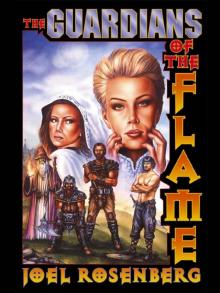 The Sword and the Chain
The Sword and the Chain Not Quite Scaramouche
Not Quite Scaramouche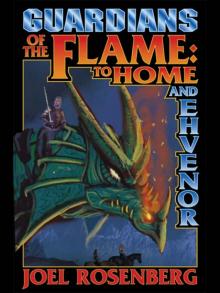 Guardians of The Flame: To Home And Ehvenor (The Guardians of the Flame #06-07)
Guardians of The Flame: To Home And Ehvenor (The Guardians of the Flame #06-07)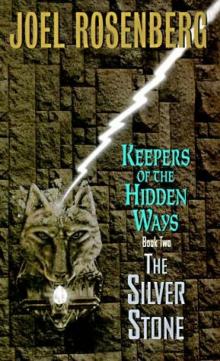 The Silver Stone
The Silver Stone Hero
Hero Not For Glory
Not For Glory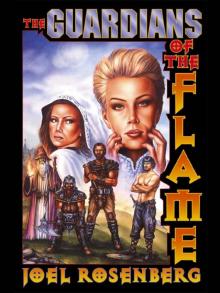 The Sleeping Dragon
The Sleeping Dragon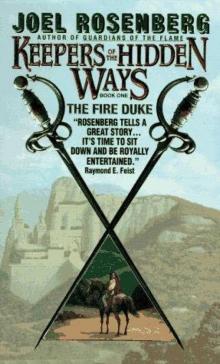 The Fire Duke
The Fire Duke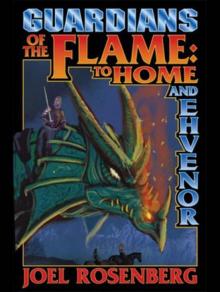 Guardians of The Flame: To Home And Ehvenor (Guardians of the Flame #06-07)
Guardians of The Flame: To Home And Ehvenor (Guardians of the Flame #06-07)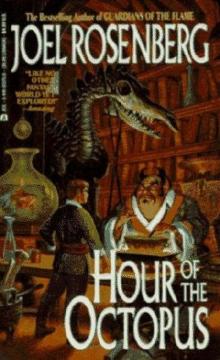 Hour of the Octopus
Hour of the Octopus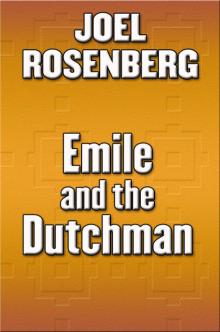 Emile and the Dutchman
Emile and the Dutchman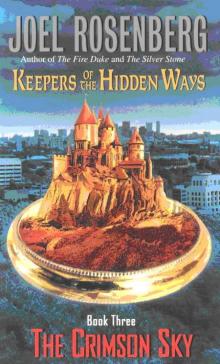 The Crimson Sky
The Crimson Sky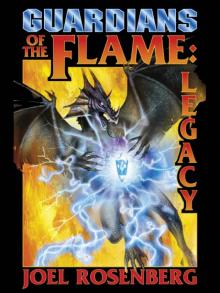 Guardians of the Flame - Legacy
Guardians of the Flame - Legacy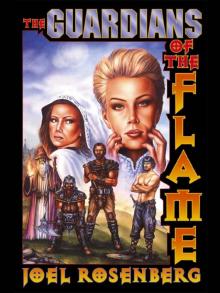 The Silver Crown
The Silver Crown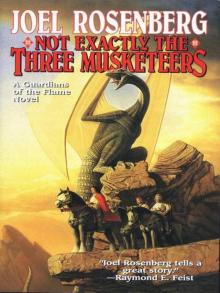 Not Exactly The Three Musketeers
Not Exactly The Three Musketeers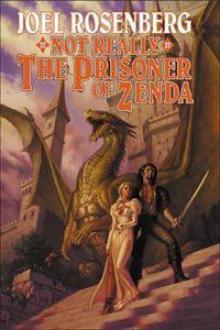 Not Really the Prisoner of Zenda
Not Really the Prisoner of Zenda